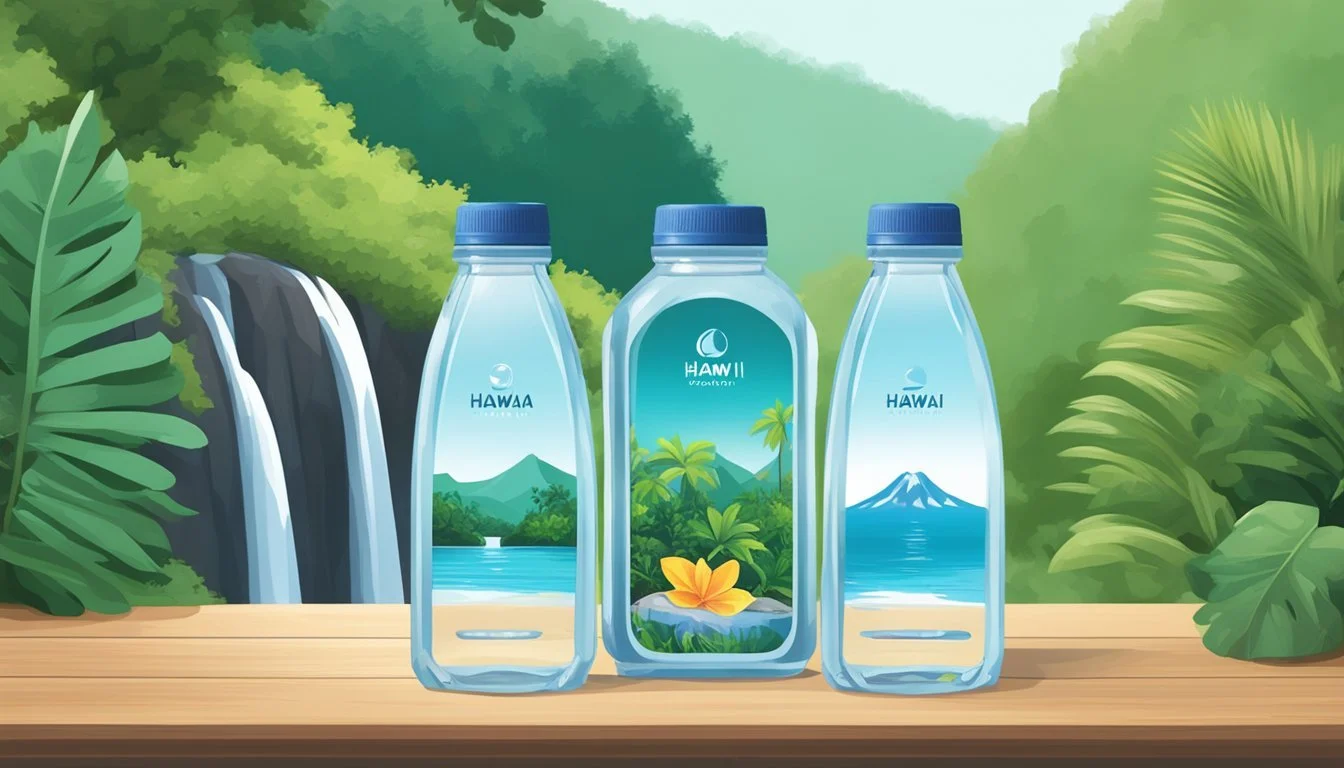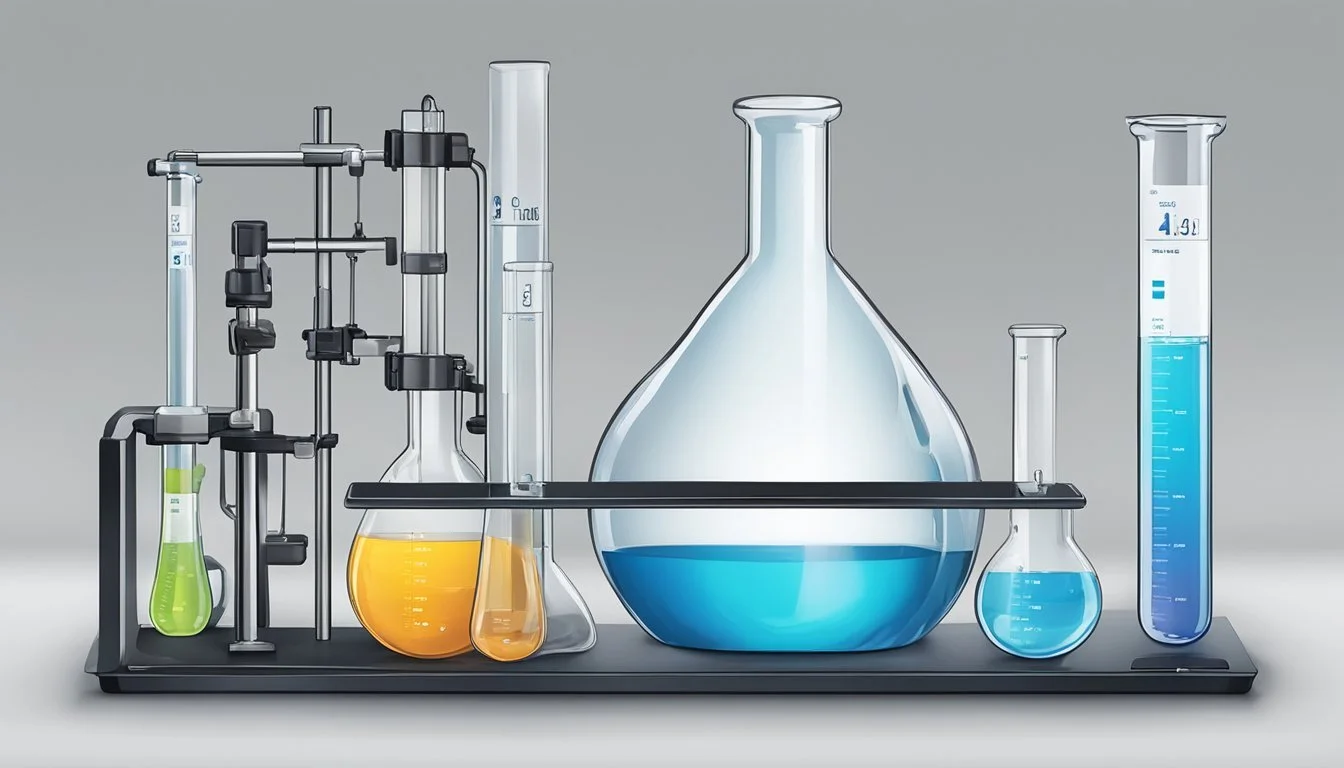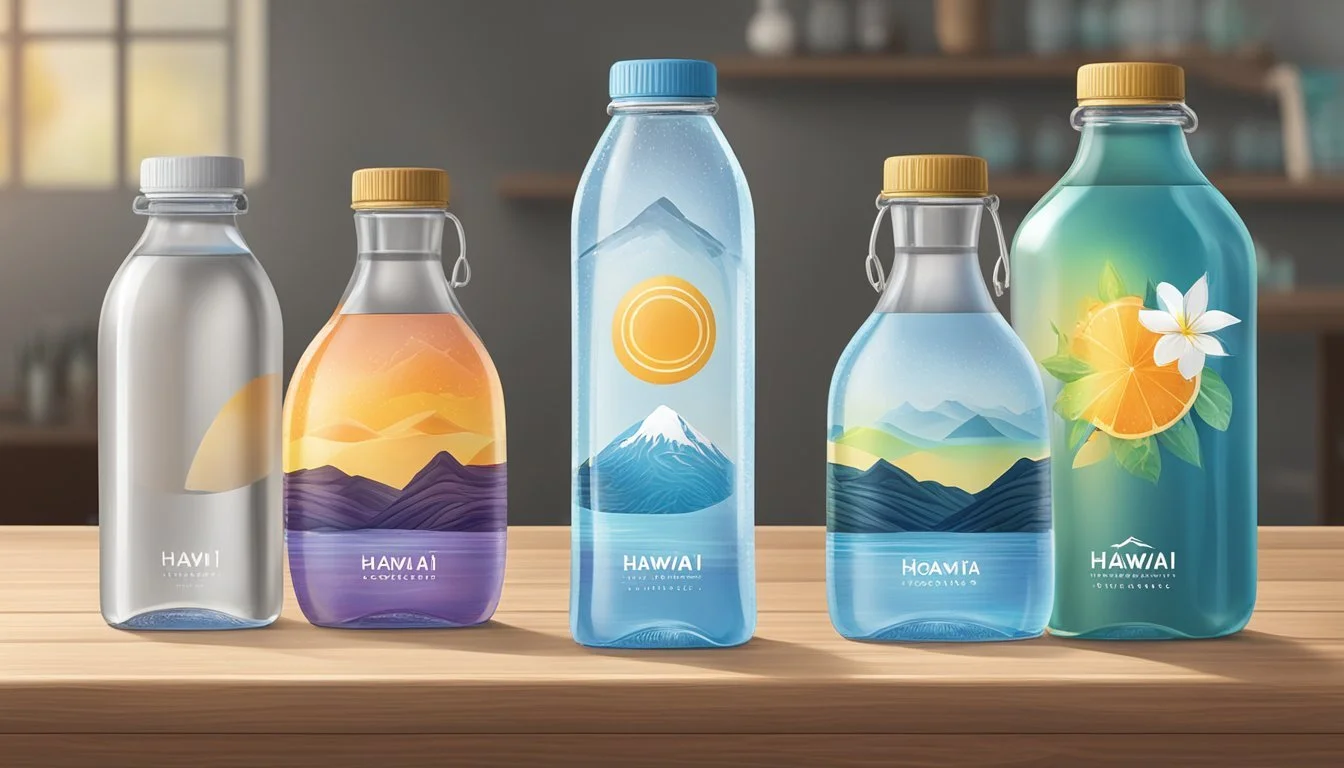Penta vs. Hawai’i Volcanic
Comparative Analysis of Premium Bottled Waters
The realm of bottled water offers a plethora of choices, but when it comes to premium options, two names frequently emerge: Penta and Hawai’i Volcanic. Penta water boasts its advanced purification process, free of additives, resulting in a pure, crisp taste that appeals to those who are health-conscious. On the other hand, Hawai'i Volcanic water, sourced from volcanic rock, provides a naturally alkaline pH level of 8.8, which can help neutralize acidity within the body.
When comparing these two, the primary difference lies in their sources and pH levels. Penta, with its ultra-purified, additive-free water, targets individuals looking for the utmost purity. In contrast, Hawai'i Volcanic offers the additional benefit of minerals and natural alkalinity, derived from its unique volcanic origins.
As more consumers seek not just hydration but also potential health benefits from their bottled water, understanding what sets Penta and Hawai'i Volcanic apart can greatly influence purchasing decisions. Whether one prioritizes purity or natural mineral content, discerning water enthusiasts are bound to find that either option caters to diverse preferences and needs.
Understanding Bottled Water
Bottled water comes in various forms, each offering unique qualities and benefits. These variations depend on the source, processing methods, and added minerals or electrolytes.
Types of Bottled Water
Bottled water can be classified into several types based on its sources and processing methods. The main types include spring water, mineral water, purified water, sparkling water, and artesian water.
Spring water originates from underground formations and flows naturally to the surface. Mineral water contains minerals naturally present in the water when it is underground. Purified water has been treated to remove chemicals and contaminants and can come from any source, including tap water. Sparkling water has dissolved carbon dioxide gas, making it fizzy. Artesian water is sourced from a well that taps a confined aquifer.
Nutritional Content and Health Benefits
The nutritional content of bottled water varies significantly depending on its type and mineral additions. Essential minerals like calcium, magnesium, potassium, and sodium are present in varying quantities.
Mineral water often has the highest mineral content, contributing to daily mineral intake. Electrolytes in some bottled waters can help maintain pH balance and overall hydration. Some brands adjust pH levels to create alkaline water, believed to neutralize acid in the body.
Health benefits include better hydration and intake of vital minerals that support bodily functions. For instance, calcium is crucial for bone health, while magnesium supports muscle and nerve function. Low-sodium options are preferable for those monitoring sodium intake.
Environmental Impact of Bottled Water
The environmental impact of bottled water production and disposal is a significant concern. Plastic bottles are a major contributor to plastic pollution, with millions ending up in landfills and oceans.
Choosing water from brands committed to sustainable practices can mitigate this impact. Some companies use rPET (recycled plastic) bottles to reduce environmental footprint. Others are focusing on reducing water waste during production.
Sustainability efforts can include using non-plastic packaging options and maintaining urgency in recycling initiatives. Ultimately, balancing convenience with environmental stewardship is key to minimizing bottled water's ecological impact.
The Science of Water pH
Understanding the pH level of water is crucial, as it can impact health, hydration, and even taste. Both Penta and Hawai'i Volcanic offer unique pH properties that merit a closer look.
Importance of pH Balance
The pH scale ranges from 0 to 14, with 7 being neutral. Water's pH level affects its acidity or alkalinity. Drinking water with a balanced pH helps neutralize acidity in the body, benefiting the immune system. Alkaline water with a higher pH can support various bodily functions and maintain optimal hydration.
Alkaline vs. Acidic Water
Water with a pH below 7 is considered acidic, while a pH above 7 is alkaline. Alkaline water is often regarded as beneficial for its potential to reduce acid levels in the body. Conversely, acidic water may have fewer health benefits and less appealing taste. Balanced pH water is ideal for most people, ensuring neutralized acidity without health risks.
pH Levels in Penta and Hawai'i Volcanic
Penta water is known for its purity and typically maintains a pH around 7, which is neutral. This makes it excellent for those seeking balanced hydration without affecting the body's pH levels.
Hawai'i Volcanic, sourced from Hawaiian volcanic springs, generally has an alkaline pH, ranging between 7.6 and 8.2. This natural Hawaiian volcanic water is favored for its ability to support bodily functions and enhance hydration with its slightly alkaline properties.
Comparing Water Sources
Both Penta and Hawai’i Volcanic offer premium bottled water, yet their sources and purification processes differ significantly. This section delves into those differences, examining the unique attributes and filtration methods of each brand.
Natural Sources and Filtration
Penta and Hawai’i Volcanic rely on distinct natural sources and employ different filtration techniques. Hawai’i Volcanic is sourced from rain that filters naturally through porous lava rock on Mauna Loa. This process inherently purifies the water via volcanic filtration, removing contaminants and enriching it with minerals.
On the other hand, Penta sources its water from natural aquifers. Penta then uses a proprietary 13-step purification process to remove impurities. Unlike Hawai’i Volcanic, Penta's purification is entirely man-made, aiming for extreme purity without the natural mineral content.
Hawai'i Volcanic's Unique Source
Hawai’i Volcanic's water originates from the Big Island's Mauna Loa volcano. The volcanic water here begins as rain, which then percolates through porous lava rock. This natural filtration system is crucial, as it removes contaminants while imparting essential minerals.
The volcanic landscape of Hilo and the Big Island provides a unique source that is hard to replicate elsewhere. The water's journey through volcanic filtration ensures a mineral-rich profile, giving Hawai’i Volcanic its distinct taste and purity. No artificial processes are used in this filtration, making it a naturally occurring and eco-friendly option.
Penta's Purification Process
Penta’s water undergoes an extensive purification process that includes 13 different steps. Starting from natural aquifers, the water is subjected to micro-filtration, reverse osmosis, and ultraviolet exposure. These methods collectively achieve 99.9% purity, stripping away all contaminants.
This exhaustive filtration ensures there are no additives or minerals left, resulting in an extremely clean water profile. While this guarantees high purity, it also means the water lacks the distinct mineral flavors found in Hawai’i Volcanic. Penta emphasizes absolute purity over natural mineral content, making it ideal for those prioritizing contaminant-free hydration.
Health and Nutritional Value
When comparing Penta and Hawai’i Volcanic bottled water, it is essential to assess their health benefits, mineral content, and effects on hydration and electrolytes. This section explores the potential advantages each brand offers.
Health Benefits of Drinking Quality Water
Quality bottled water can offer numerous health benefits, especially when it comes to hydration. Both Penta and Hawai’i Volcanic emphasize purity, which is crucial for maintaining bodily functions.
Hawai’i Volcanic is noted for its slightly alkaline pH, potentially aiding in better hydration and overall health. Alkaline water is believed to help balance the body's pH levels.
Penta water is known for its advanced purification process, which removes impurities. This ultra-purified water can be beneficial for individuals with sensitive digestive systems or those looking to avoid contaminants.
Mineral Content in Penta and Hawai'i Volcanic
Mineral content is a significant factor in choosing bottled water, as minerals like calcium and magnesium are essential for health.
Hawai’i Volcanic contains a range of minerals, including silica, which promotes healthy skin, hair, and nails. With natural mineral content, it provides calcium and magnesium, supporting bone health and muscle function.
Penta Water is virtually devoid of minerals due to its extensive filtration. It is purified to remove contaminants, making it an option for those who prioritize pure water over mineral content.
Hydration and Electrolytes
Hydration is critical for everyone, especially athletes who require optimal fluid balance for peak performance.
Hawai’i Volcanic offers a slight edge with its electrolyte-filled profile. Rich in potassium, it aids in maintaining fluid balance and preventing muscle cramps. The eco-friendly packaging emphasizes sustainability while providing essential electrolytes.
Penta water lacks naturally occurring electrolytes due to its purification process. Though extremely pure, it does not offer the same hydration benefits as mineral-rich options, making it less optimal for those in need of electrolyte replenishment after intense physical activity.
In approaching hydration needs, mineral-rich options often prove more effective in supporting both everyday and athletic hydration.
Taste Profile
Penta offers a very clean and refreshing taste. This bottled water is known for its pure and crisp qualities due to its advanced purification process.
In comparison, Hawai’i Volcanic features a distinct crisp and refreshing profile with a noticeable hint of minerality.
Comparison Table
Attribute Penta Hawai’i Volcanic Texture Smooth, Clean Crisp, Refreshing Sweetness Subtly sweet Slight minerality Taste Notes Pure, Highly purified Clear, Minerally
Penta aims to provide an exceptionally pure water experience, which appeals to those who prefer a neutral taste without any aftertaste.
On the other side, Hawai’i Volcanic comes from a volcanic source, adding a unique mineral aspect to the water. This minerality might be appealing for those looking for a slightly more complex water taste.
Both brands focus on healthy hydration, offering distinct experiences to cater to different preferences.
Sustainability and Community Initiatives
Penta and Hawai’i Volcanic both prioritize sustainability and community support. They engage in diverse efforts ranging from environmental stewardship to educational initiatives and innovative packaging solutions.
Stewardship and Conservation Efforts
Hawai’i Volcanic sources its water from the slopes of Hawaiian volcanoes, emphasizing responsible usage. They bottle less than 0.003% of the water yielded, ensuring minimal impact on local water supplies. This careful stewardship helps preserve the natural environment.
Penta, on the other hand, implements advanced water purification and recycling techniques. Their focus is on reducing water waste and maintaining the purity of the water throughout the production process.
Both brands demonstrate a commitment to environmental conservation through their sourcing methods and sustainable water usage practices.
Community Support and Educational Initiatives
Hawai’i Volcanic is involved in several community support programs, including the Kokua Initiative. This effort seeks to provide clean water access and educational opportunities in underserved regions. By partnering with local organizations, they contribute to better living standards and promote sustainable practices.
Penta collaborates with international charities such as Pump Aid, focusing on providing clean water solutions in Malawi, Africa. Their initiatives aim to improve community health and support development through the construction of sustainable water systems.
Both companies understand the significance of giving back to the community and prioritize projects that offer tangible benefits.
Packaging and its Environmental Effects
Hawai’i Volcanic markets its water in eco-friendly packaging, emphasizing the use of materials that are less harmful to the environment. They often use aluminum, which is easily recyclable, to reduce packaging waste.
Penta also focuses on sustainable packaging, utilizing 100% recycled PET (rPET) bottles. This approach significantly lowers their carbon footprint by reducing energy consumption and water usage during production.
Both brands strive to minimize their environmental impact through careful choice of packaging materials, helping to reduce pollution and promote recycling.
Cost Comparison
When comparing bottled water brands like Penta and Hawai’i Volcanic, cost is an essential factor.
Penta Water is often found in premium grocery stores such as Whole Foods Market. It is priced higher than many common bottled water brands due to its extensive purification processes and claims of providing ultra-pure water.
On the other hand, Hawai’i Volcanic is also positioned in the premium bottled water category. It sources its water from volcanic aquifers in Hawaii, which contributes to its higher price point.
Brand Common Retailer Average Price (per liter) Penta Water Whole Foods Market $2.50 - $3.00 Hawai’i Volcanic Whole Foods Market $2.75 - $3.25
Both brands position themselves above more mainstream options like Fiji Water, which can be found at similar retailers, usually at slightly lower prices:
Brand Average Price (per liter) Fiji Water $2.00 - $2.50
These higher prices reflect their marketing as premium waters. Penta prides itself on purity, while Hawai’i Volcanic emphasizes its natural volcanic filtration.
When shopping at high-end grocery stores, customers can expect to pay a premium for both brands as they offer distinct value propositions.
The Final Verdict
When comparing Penta and Hawai’i Volcanic, several factors come into play: health benefits, sustainability, taste, and cost.
Health Benefits:
Penta water boasts of its rigorous purification process, which removes impurities and contaminants. It's marketed as ultra-pure with no additives. Hawai’i Volcanic, on the other hand, is slightly alkaline, potentially aiding hydration and balancing body pH levels.
Sustainability:
Hawai’i Volcanic prioritizes eco-friendly packaging, often using recyclable materials. This effort underscores their commitment to sustainability. Penta’s approach is less emphasized on sustainability but focuses more on the purity aspect.
Taste:
Taste is subjective and varies among individuals. Penta water is known for its crisp, clean taste due to its high purification. Hawai’i Volcanic has a natural, slightly alkaline taste that many find refreshing.
Cost:
Pricing can be a deciding factor. Penta water is generally positioned as a premium product, which can be reflected in the cost. Hawai’i Volcanic also positions itself as premium, but their emphasis on sustainability might appeal to environmentally conscious consumers.
Here's a brief comparison:
Criteria Penta Hawai’i Volcanic Health Ultra-pure, no additives Slightly alkaline, aids hydration Sustainability Less emphasis Eco-friendly packaging Taste Crisp, clean Natural, refreshing Cost Premium pricing Premium pricing with eco-conscious appeal
Each brand offers distinct advantages, leaving the choice to personal preference based on what factors they prioritize most.
More About Penta
Mountain Valley Spring Water vs Penta: Which Bottled Water is Better?
Penta vs Richard's Rainwater: Which Bottled Water is Better?
Penta vs Whole Foods Italian Still Mineral water: Which Bottled Water is Better?
More About Hawai’i Volcanic
Acqua Pana vs Hawaii Volcanic: Which Bottled Water is Better?
Antipodes vs Hawaii Volcanic: Which Bottled Water is Better?
Aqua Carpatica vs Hawaii Volcanic: Which Bottled Water is Better?
Arrowhead vs Hawaii Volcanic: Which Bottled Water is Better?
Boxed Water vs Hawaii Volcanic: Which Bottled Water is Better?
Castle Rock vs Hawaii Volcanic: Which Bottled Water is Better?
Core Hydration vs Hawaii Volcanic: Which Bottled Water is Better?
Deer Park vs Hawaii Volcanic: Which Bottled Water is Better?
Hawaii Volcanic vs 1907water: Which Bottled Water is Better?
Hawaii Volcanic vs Alkaline88: Which Bottled Water is Better?
Hawaii Volcanic vs Big Chill: Which Bottled Water is Better?
Hawaii Volcanic vs BodyArmor: Which Bottled Water is Better?
Hawaii Volcanic vs Cascade Mountain: Which Bottled Water is Better?
Hawaii Volcanic vs CBD Living: Which Bottled Water is Better?
Hawaii Volcanic vs Crystal Geyser: Which Bottled Water is Better?
Hawaii Volcanic vs Crystal Lake: Which Bottled Water is Better?
Hawaii Volcanic vs Essence pH10: Which Bottled Water is Better?
Hawaii Volcanic vs Kirkland Signature: Which Bottled Water is Better?
Hawaii Volcanic vs Liquid Death: Which Bottled Water is Better?
Hawaii Volcanic vs Open Water: Which Bottled Water is Better?
Hawaii Volcanic vs Proud Source: Which Bottled Water is Better?
Hawaii Volcanic vs Pure Life: Which Bottled Water is Better?
Hawaii Volcanic vs Purely Sedona: Which Bottled Water is Better?
Hawaii Volcanic vs Richard's Rainwater: Which Bottled Water is Better?
Hawaii Volcanic vs Simple Truth: Which Bottled Water is Better?
Hawaii Volcanic vs Talking Rain AQA: Which Bottled Water is Better?
Hawaii Volcanic vs Weird Water: Which Bottled Water is Better?
Hawaii Volcanic vs Whole Foods 365: Which Bottled Water is Better?
Hawaii Volcanic vs Whole Foods Italian Still Mineral water: Which Bottled Water is Better?
Hawaiian Springs vs Hawaii Volcanic: Which Bottled Water is Better?
Ice Mountain vs Hawaii Volcanic: Which Bottled Water is Better?
Icelandic Glacial vs Hawaii Volcanic: Which Bottled Water is Better?
Just Water vs Hawaii Volcanic: Which Bottled Water is Better?
Mountain Valley Spring Water vs Hawaii Volcanic: Which Bottled Water is Better?
Nestle Pure Life vs Hawaii Volcanic: Which Bottled Water is Better?
Poland Spring vs Hawaii Volcanic: Which Bottled Water is Better?
San Pellegrino vs Hawaii Volcanic: Which Bottled Water is Better?
Smartwater vs Hawaii Volcanic: Which Bottled Water is Better?
Solan de Cabras vs Hawaii Volcanic: Which Bottled Water is Better?
Topo Chico vs Hawaii Volcanic: Which Bottled Water is Better?
Zephyrhills vs Hawaii Volcanic: Which Bottled Water is Better?






